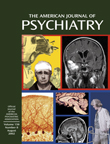Supplemental Nocturnal Nasogastric Refeeding for Better Short-Term Outcome in Hospitalized Adolescent Girls With Anorexia Nervosa
Abstract
OBJECTIVE: Although controversy exists regarding nasogastric refeeding for patients with anorexia nervosa, current methods of inpatient care often result in low discharge weight, a critical risk factor in relapse. This study compared the short-term outcomes of standard oral refeeding and supplemental nocturnal nasogastric refeeding. METHOD: Subjects were 100 hospitalized Caucasian adolescent girls who met DSM-IV criteria for anorexia nervosa. Subjects were partitioned into two groups: oral refeeding (N=48, mean age=15.0 years, SD=1.8) and nocturnal nasogastric refeeding (N=52, mean age=14.8 years, SD=1.9). Unpaired t tests, with Bonferroni correction, were used to compare groups at hospital admission and at discharge. Multivariate linear regression was used to establish the independent effects of nocturnal nasogastric refeeding after adjustment for potential confounding variables. RESULTS: On admission, the groups were comparable in terms of age, weight, and other factors but differed significantly in number of prior hospitalizations (the nocturnal nasogastric refeeding group had more than the oral refeeding group). A series of separate multivariate linear regression models revealed that nocturnal nasogastric refeeding was a significant predictor of weight at discharge and absolute weight gain. CONCLUSIONS: Over a comparable period of time, patients treated with nocturnal nasogastric refeeding had a greater and more rapid weight gain than patients treated with traditional oral refeeding. Supplemental nocturnal nasogastric refeeding was more effective than oral refeeding alone in weight restoration during hospitalization. However, further study is needed on its short-term and long-term effectiveness.



